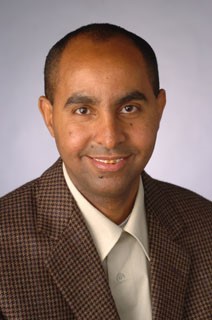
Invited Speaker:Prof. Tewodros Asefa
Introduction:Tewodros Asefa completed his Ph.D. at the University of Toronto in 2002 with Professor Geoffrey A. Ozin. He was then an invited Miller Fellowship nominee by Professor Peidong Yang at the University of California at Berkeley and a post-doctoral fellow at McGill University with Professor R. Bruce Lennox. He currently serves as a joint Full Professor in the Department of Chemistry and Chemical Biology and the Department of Chemical and Biochemical Engineering at Rutgers University (NB). His group is involved in the development of synthetic methods to a wide array of functional nanomaterials and the investigation of their potential applications in catalysis, nanomedicine, solar-cells, and environmental remediation. He held NSF CAREER Award, was the National Science Foundation American Competitiveness Fellow (NSF ACI) in 2010, is a recipient of multiple federal and local research grants. He holds several patents, co-edited a book on Nanocatalysis (for Wiley) in 2013, and published over 185 peer-reviewed papers (on Nature, Nature Materials, Acc. Chem. Res, JACS,Angewandte Chemie, Advanced Materials, Advanced Functional Materials, Nano Energy, et.al, 16 highly cited papers and several cover papers) and book chapters. His citation record currently stands at >16,500 with an h-Index of 57.
【Title】Heteroatom-Doped Carbon Nanomaterials and their Composites: Sustainable Catalysts for Fuel Cells and Water Splitting
Time: 10:00 am, May 24th, 2019
Location: New MSE Building, No. 01 Meeting Room (新材料大楼材料学院第一会议室)
Abstract:The lack of sustainable and efficient catalysts for many renewable energy applications (e.g., fuel cells and water splitting) and the unabated negative environmental impacts of fossil fuels remain among the most pressing issues facing the world today. In this talk, my research group’s recent efforts on the synthesis of catalytically active nanostructured and nanoporous heteroatom-doped, metal-free or noble metal-free materials and their composites. These materials are found to exhibit high catalytic and catalytic activities for reactions such as the oxygen reduction reaction (ORR), the hydrogen evolution reaction (HER), the oxygen evolution reaction (OER), and the hydrazine oxidation reaction (HOR)—reactions that are relevant to fuel cells and water splitting, or renewable energy in general—will be discussed. Particular focus will be given to the various novel design, “nanostructuring” and heteroatom doping synthetic approaches employed in my group to make a series of efficient catalysts. Moreover, fundamental and theoretical studies that helped us to unravel catalytic active sites on some of these materials and the mechanisms by which they effectively catalyze some of these hard-to-catalyze reactions in fuel cells and electrolyzers will be discussed.
Welcome to attend the lecture!


